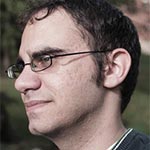Brian Fanelli

Class of 2006
Poet (twice nominated for a Pushcart Prize); Instructor, Lackawanna College
Creative Writing and Higher Education
When anyone asks me why I became a poet, I fondly recall the poetry courses that I took during my junior and senior years at West Chester University. I can still remember sitting in a classroom in Main Hall, critiquing the work of my classmates and listening to the feedback they shared with me. I learned that writing is a process and no first draft is perfect. This is a skill that is transferable to any type of job that requires written communication. I also recall the thick anthology of verse that I lugged around campus, and the poets I read over and over again, including Philip Levine, Gwendolyn Brooks, Sharon Olds, Richard Wilbur—names I had not known until my first poetry courses. By the end of my first workshop, I learned that to be a good writer, one must read as much as possible. This is a lesson that I frequently share with my students.
Furthermore, the literature courses exposed me to all major genres of writing, including poetry, fiction, historical narratives, drama, and memoir. By reading so much, I was able to find and develop my own voice, with the help of a few heroes who lived on the page. My work and teaching are also influenced by broader social and political issues, and the literature I encountered taught me to pay attention to the world around me, especially as a writer. My experience at WCU made me a well-rounded, engaged citizen. Every professor encouraged class dialogue and discourse that fostered more serious thinking about the issues and headlines of the day.
WCU’s small class sizes created a community that still plays an important role in my life today. I communicate and spend time with my fellow WCU alumni. We frequently ask each other about our latest writing projects, and this is a way to ensure that we're still practicing our craft and engaging with the world. We also share book recommendations via e-mail or through social media. Without the community and support I had at WCU, I'm certain that I would not have become a writer or full-time instructor of literature. When I stand in front of a classroom or offer my students feedback on their writing, I hope that the experience they have as a college student is as memorable and meaningful as my experience was at WCU.
